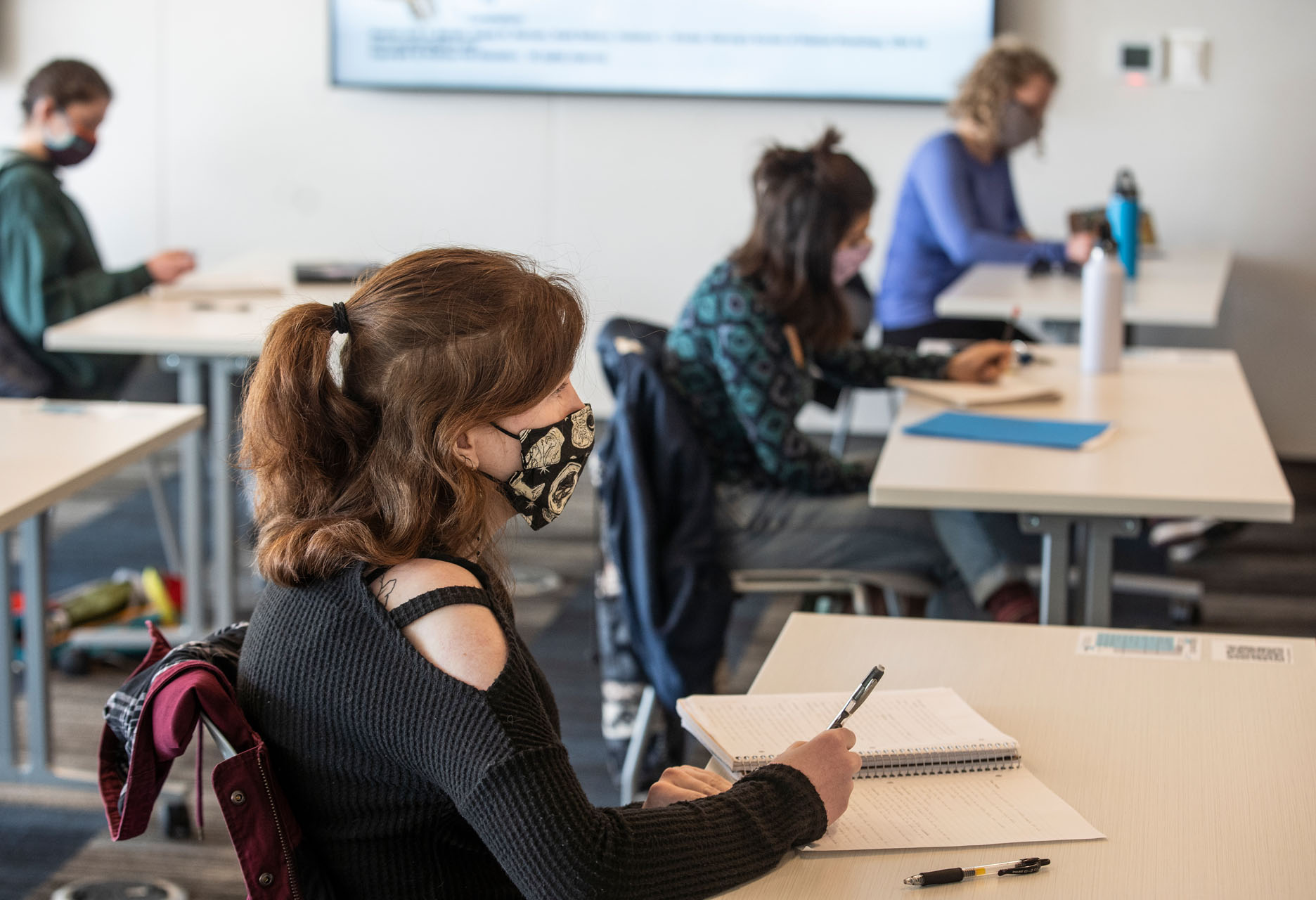This past Block 5, Professor of Psychology Kristi Erdal and her 15 students embarked on a journey that’s easier said than done this year: an in-person class. Her course, Human Neuropsychology, met in person to discuss the complex organization of the human central nervous system, which includes everything from memory, language, and emotional disorders. Students gathered to learn brain imaging techniques, neuropsychological assessments, and to fully immerse themselves in a challenging, interesting, and rewarding course during a year where potentially all their other classes ran remotely.
In the pursuit of this difficult learning, there were many challenges that were not exactly academic. With 15 students, there was no classroom big or well-ventilated enough in Tutt Science Center for every student to attend class safely. This meant a transition to Tutt Library 201, a larger room where students had spaced desks, the doors to the outdoor balcony constantly could be open, and several television screens for students to present from various points in the room without having to get up and leave their designated areas. On top of that, every student needed to have the proper access to campus, social distance entirely, and wear a mask. Even given all these caveats, for Professor Erdal, “all the hurdles never outweighed the benefit of three-dimensional teaching and learning,” especially for those in the class graduating this year.
As the course normally functions, Erdal has many relevant presenters in the field and even a trip to visit Craig Hospital in Denver to do clinic evaluations and see how the world of neuropsychology works in the field, both of which had to be amended given the circumstances. While the field trip was ultimately canceled, the visitors all had to call in via Zoom, showing just how important keeping the integrity of a normal year’s class was to Erdal.
While the class is demanding academically, the amount that students had to aid and support one another in the pursuit of keeping the class in person for the entire block was just as demanding. Professor Erdal knew it was important for each student to feel comfortable with the circumstances of the pandemic and made sure that no one felt behind or excluded due to contact tracing and feeling ill. To do this, Erdal created a system called “Zoom buddies,” a pair of students who were assigned to one another and accountable for sharing notes, Zoom-ing each other during class, and even meeting for online study sessions if either of the pair was ever unable to attend class. The “Zoom buddies” made it so that every student felt like they were still keeping up and participating in the class whenever unable to attend due to CC rules, contact-tracings, and keeping the CC community safe if they ever felt ill. Erdal also wore a clear mask for all students who learned better visually, or who didn’t speak English as their first language, or who simply needed some extra visual cues while sitting away across the room. No matter the obstacle, Erdal had a quick fix to make in-person learning as “normal” as possible.
For the students, Erdal’s effort, consideration, and care did not go unnoticed. For Thomas Perry ’21, this was his second in-person class of the year (both taken with Erdal). Perry says he really felt that this class was his “last hurrah,” and was incredibly grateful for the effort that was put into the course. “It’s heartwarming to see Colorado College students work together to keep each other safe,” he said. “Especially during COVID times, it’s so easy to judge others for what they aren’t doing, and it’s so relieving to have seen us all be so good.” Perry also noted how wonderful it was to see somebody’s facial expressions again, even if it was just through Erdal’s see-through mask.
For Christine Calger ’21, Erdal’s approach to the class as a community effort also shone through. Calger’s favorite part of the block was the attention to detail that was put into what could’ve been an incredibly difficult learning environment. All the readings were engaging, the visitors highly interesting, and the class engagement high, she says.. Although Calger’s original life plan was to go to medical school, “this course has made me consider neuropsychology as an alternate path,” she says.
Although the class is centered around neuropsychology in the clinical sense, it couldn’t be more relevant this year. Erdal recently co-hosted a CC panel on mental health, noting the consequences that all virtual learning could have on a student. The ability to be part of a class where students can interact, see, and learn from each other in an in-person setting was something she knew needed to happen. Erdal’s classes have had zero incidents, and the students understand exactly what’s at stake. Erdal knows also, that “especially for seniors, it was important to give them a seminar experience as close to what they would have gotten in a non-COVID year as possible.”
For Erdal and her graduating seniors, the most impressive part of this course (beyond the complex neurology and psychology work), was the will and compliance of the entire class. For Perry, “despite all the terrible stuff that has come out of COVID, I think in many ways it has fostered a community-based ethic I haven’t experienced so much before.”
With all the negative to come out of the pandemic, there is a new reinforced faith in Colorado College students that had yet to be tested before this academic year. Beyond the great work and intellectual excitement her students brought to the classroom in Block 5, Erdal noted that her students’ “understanding of the gravity of a pandemic, along with their willingness to be somewhat inconvenienced in order to learn, was inspiring. They ‘brought it’ all year and it was terrific to be a part of.”
Professor Kristi Erdal co-hosted “CC Conversations on Mental Health in this Disembodied Year” and will continue to teach in person for the rest of the semester.










